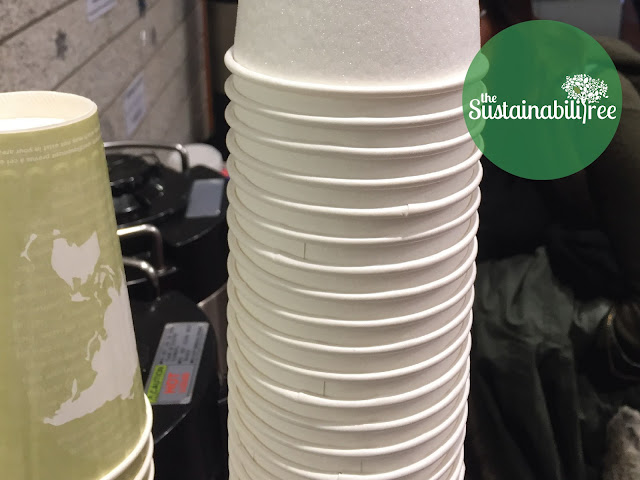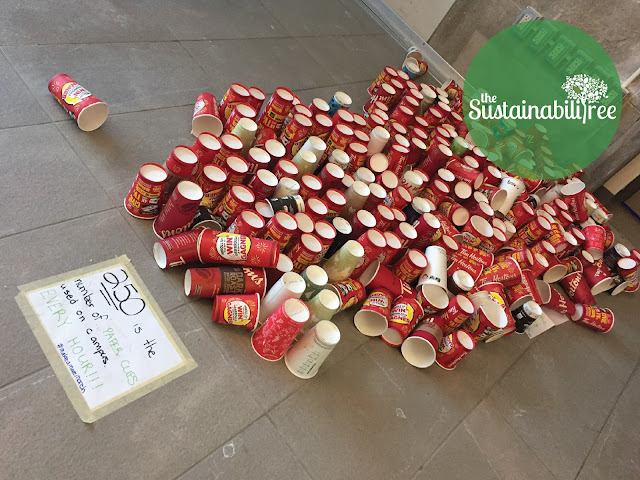For those who are plugged into the zeitgeist, the number 10,000 probably has a lot of significance. The 10,000 hour rule is a controversial idea that it takes 10,000 hours to master something. 10,000 steps means that you are on your way to a healthy level of fitness. At 10,000 feet you gain enough perspective to see the big picture. But I think that one of the most import things is that it is preceded by 9,999, which as we can all agree is a pretty big number.
A decade ago our office came across a really startling statistic... every day on campus 6,500 disposable cups were being used. We figured out a bunch of different ways of representing what 6,500 disposable coffee cups means... if you stacked them end to end it would be 7 times the height of the peace tower, they could fill up 10 tennis courts, it is the equivalent weight of 125 basket balls... etc.

For the longest time we kept talking to people about what a huge number this was. The concept that our simple little campus could produce so much waste was jarring and it encouraged some people to change their ways. But scaring people into change isn't that best solution and the proof might be in the pudding because now, 10,000 is the new 6,500. Roughly 50,000 disposable coffee cups are consumed on campus every week (roughly 10,000 when you factor out that the weekends are dead on campus).
Let's drop the ominous stats for a moment and let's get to solutions.
The first question we want to answer is why? Why are there more cups than before even though there are a myriad of programs like Muggy Mondays and cup discounts that should be driving that number down; not to mention the ever growing awareness of environmental issues. Aren't today's youth supposed to be more caring and empathetic towards the environment then ever before? Shouldn't a university, a place of higher education and learning, be populated with people more aware of their impacts on the planet?

Well it would seem that there is a simply answer, actually it is the same answer that always pops up when it comes to these issues... convenience. A disposable coffee cup is one that you don't have to carry with you; it is one that you don't have to clean; it is always where you need to be and it doesn't overstay it's welcome... well at least not in your day to day. And it doesn't hurt that in the past year, a new Tim Hortons location opened on campus located right in the heart of the largest study space uOttawa has to offer. How can you beat that?
So there are three solutions to this problem the way I see it.
Option number one, raise awareness and change people's minds. This is a good option but it requires a bunch of input. Students rotate in and out every year, you basically always have to refresh your message, and you are always trumped by convenience. But on the positive side, if you can get through to people, you will likely have created lasting change.

Option number two, push reusable mugs on the masses. There are many ways to get reusable mugs into the hands of the people but the trick is to do it in a way that is cheap and effective. There are reusable mug discounts, there are free mug lending programs and giveaways, there are mug rental programs, there are a bunch of things. On the negative side, mugs get lost, people don't value the mugs because they are ubiquitous, and people learn to bring mugs with them.

Option number three, ban disposable cups. This option forces people to fend for themselves and incentivizes people bringing their own mugs. There are no fancy tricks, food service providers figure out what they want to do, and people learn pretty quick the rules of the game... bring a mug or spend a long morning trying to stay awake. You can still run mug lending services or sell reusable coffee mugs but the downside is that the program isn't very forgiving and you might just push people to buy their coffee off campus and ferry it in. Then you end up with disposable cups anyways and you lose a bunch of money.

So what do you think? Staring down the barrel of thousands of cups a day, hundreds of thousands a year... what would you do? How would you deliver a program to reduce waste?
I am all ears.
~jonathan rausseo - campus sustainability manager








Comments